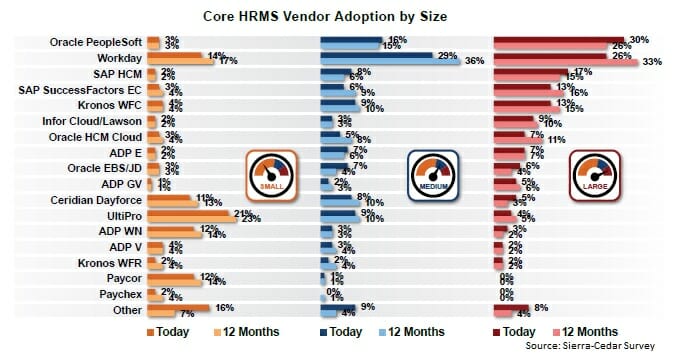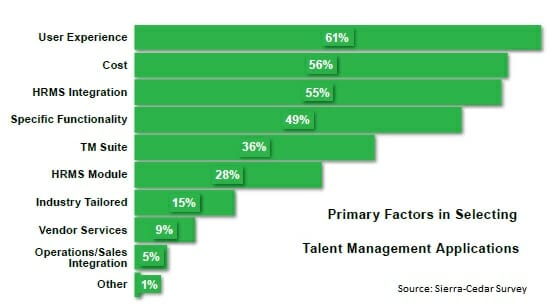According to Sierra-Cedar’s recent HR Systems survey* the Sierra-Cedar 2018-2019 HR Systems Survey White Paper 21st Annual Edition, the two human capital management areas that businesses are most likely to measure are employee turnover and performance. The research demonstrates that talent-driven organizations see 11% higher business outcomes, meaning this focus on retaining and developing talent is no longer a nice-to-have; it’s mission critical.
Despite this, the research also found that many organizations have yet to adopt specialized talent management technology. In fact, nearly one-quarter of mid-sized and large companies use the general Human Resources Management System (HRMS), Workday, to manage and develop their talent — and other HRMS tools like SAP SuccessFactors and Oracle PeopleSoft also widely used, especially at larger companies.
But fewer than a quarter of these companies – in most cases far fewer — feel their HRMS from any vendor is meeting all of their talent management needs.
Not built for talent management
HR leaders at forward-thinking organizations have increasingly recognized the need to replace ineffective and demotivating annual performance reviews with a more valuable continuous process. A general HRMS is just not built to effectively deal with continuous elements, like aligning an individual employee’s goals with those of the company and updating goals and progress towards them regularly throughout the year.
General HRMS also cannot ensure that managers and employees regularly have the crucial conversations about performance-related feedback, career development opportunities and personalized recognition and rewards. Nor does it provide the kind of actionable, up-to-date workforce insights that help HR understand how individuals and teams are performing, identify top talent, and determine where skill gaps exist in their organization.
A general HRMS wasn’t designed to deal with the dynamic nature of a continuous approach to managing performance, so it’s no surprise so few organizations feel their HRMS meets all their talent management needs. Instead, nearly half of firms who are looking for talent management technology to support their talent-driven strategy are basing their decision on it having specific functionality needed for their unique business and process.
The UX importance
 The biggest deciding factor for organizations choosing a talent management technology is user experience. A clunky, outdated user experience may have been tolerated when organizations set goals and reviewed performance just once a year, but when a business wants the benefits of a continuous process an intuitive, seamless and social UX is critical. So important that the top factor influencing TM selection, according to the survey, was User Experience at 61%.
The biggest deciding factor for organizations choosing a talent management technology is user experience. A clunky, outdated user experience may have been tolerated when organizations set goals and reviewed performance just once a year, but when a business wants the benefits of a continuous process an intuitive, seamless and social UX is critical. So important that the top factor influencing TM selection, according to the survey, was User Experience at 61%.
Talent management industry analyst Josh Bersin regularly highlights the importance of HR tech being part of the employee’s “flow of work”. Otherwise it becomes a tax or additional burden that they use reluctantly instead of seeing it as something valuable to their performance and careers. When managers and employees aren’t using a talent management tool effectively or at all, the business won’t see a return on its investment.
In today’s modern workplace, mobile is a must-have for providing familiar consumer-style experiences that employees enjoy using. More than 50% of organizations now have some form of mobile HR, with mobile talent and performance apps expected to grow by around 150% over the next 12 months.
Customizing each continuous approach
While every continuous performance program will share common foundations including goal setting, conversations, feedback, recognition and actionable insights, the process will be different for each organization depending on size, environment, industry and makeup of its teams.
The ability to quickly and easily customize talent management technology to meet an organization’s unique structure, context and objectives is part of the specific functionality that many businesses require. As an organization grows and evolves, the technology needs do likewise to support the evolving process. This is why the new breed of specialized talent management services are becoming more than just software providers, they are true partners.
More than half of large organizations rely on their HR tech vendors to advise and support on their talent strategy and program roll-out, as well as ongoing configuration and implementation of the platform. Sierra-Cedar’s survey shows that the more a business partners with its talent management tech provider, the better business outcomes it reports, especially for user adoption rates.
Working seamlessly with HRMS
While a general HRMS isn’t designed for the continuous performance approach increasingly desired by forward-thinking organizations, it remains a powerful backend workhorse for HR. The rich insights generated by continuous performance data about each employee’s performance, skills and readiness must be integrated with the HRMS, which is why 55% of businesses say that seamless HRMS integration is a key requirement for a specialized talent technology.
The ability to use these learnings in real-time to boost individual and team performance and keep employees engaged and motivated increases HR’s impact within the organization. With help from talent management services that specialize in continuous performance, provide a user-friendly experience, offer support on strategy and implementation and fill the gaps in widely-used HRMS systems, the best HR teams are becoming critical drivers of business growth.
